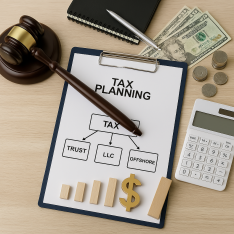Comprehensive Legal Assessment of Supply Chain and Supplier Risks in the US
Business in the US is like a complex mechanism: one disruption in the supply chain—and the entire system can come to a halt. Did a supplier miss deadlines? Is cargo stuck at customs? Or worse—is your partner accidentally linked to sanctions lists? These are not just inconveniences but serious threats to profit and reputation.
This is why a comprehensive legal assessment of supply chain and supplier risks becomes that "insurance shield" protecting businesses from problems that could cost dearly.
What does this service include?
Imagine: a company signs a contract with a new supplier. Everything looks great—the price is attractive, the promises are serious. But six months later, it turns out that this supplier has ongoing lawsuits, and the goods don’t meet US standards. The result—disrupted deliveries, lost clients, and a damaged reputation.
To avoid such scenarios, the attorney takes on:
- in-depth contract analysis—ensuring there are no "traps" for your company in the agreements;
- supplier checks: financial stability, reputation, absence of legal disputes or ties to high-risk jurisdictions;
- compliance assessment with US laws—customs regulations, sanctions, trade laws;
- identification of weak points in logistics: what could cause delays or disruptions;
- recommendations: how to amend contract terms to maximize your protection.
Why is it risky to proceed without an attorney?
Many business owners think: "We can check partners ourselves; why pay an attorney?" However, practice shows otherwise. In the US, fines for trade or sanctions violations can reach millions, and customer lawsuits can "bury" a company.
An attorney doesn’t just read papers. They:
- notice details that owners overlook in their daily routine;
- understand how regulators operate and prepare businesses for inspections;
- create a "safety cushion" so that in case of conflict, you have strong legal grounds.
How does the attorney work, and when should you order the service?
The work is done in several stages. First, the attorney gets to know your business: what goods, what markets, what suppliers. Then—document and situation analysis: contracts, licenses, customs declarations, supplier history. It all concludes with a report and clear advice on what to change and what to leave as is.
Most often, companies seek this service in three cases:
- Before signing a new contract with a supplier.
- When the business is expanding and new partners are involved.
- After a "warning sign"—for example, the first delivery delay or suspicious behavior from a counterparty.
What are the benefits of such an assessment?
- You save money: it’s cheaper to prevent risks than to fight in court.
- Peace of mind for the owner: you know for sure that your suppliers are "clean" and reliable.
- Business resilience: even if one partner drops out, you’re not left defenseless.
ConclusionA comprehensive legal assessment of supplier risks is not an unnecessary formality but a strategic investment in business stability. It works like a regular health check-up: it’s better to detect a problem early than to "treat" a catastrophe.
Here, the attorney becomes not just a dry legal expert with codes but a partner who sees more and helps avoid situations where one wrong supplier choice could undo years of work.



































